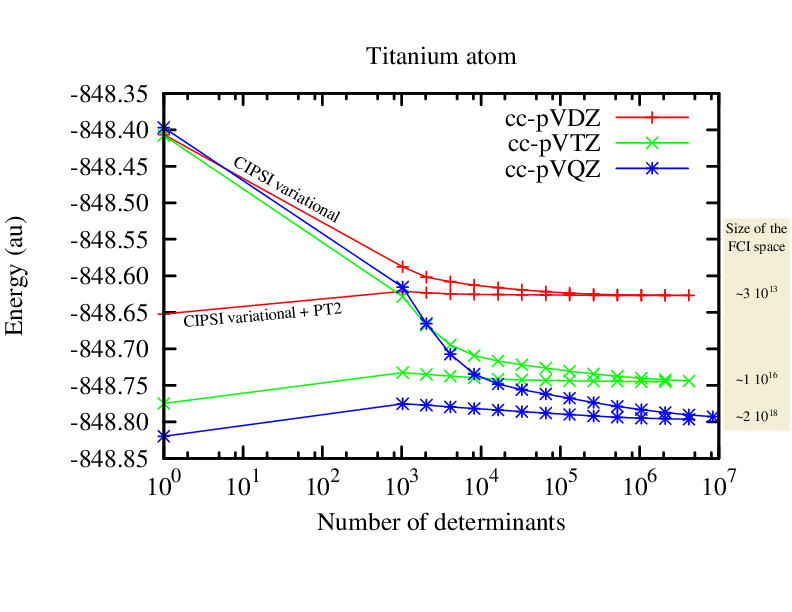If you have problems upgrading to the current version, first try
qp_upgrade_ocaml.sh. If it fails, then consider re-installing everything from
scratch including the OCaml compiler. To do this, you will have to remove the
quantum_package directory and the $HOME/.opam directory as well.
Set of quantum chemistry programs and libraries. (under GNU GENERAL PUBLIC LICENSE v2)
For more information, you can visit the wiki of the project, or below for the installation instructions.
- Fortran compiler (
ifortandgfortranare tested) - Python >= 2.6
- GNU make
- Bash
- Blas/Lapack
- unzip
- g++ (For ninja)
$ ./configure <config_file>
For example you can type ./configure config/gfortran.cfg
This command has two purposes :
- Download and install all the requirements. Installing OCaml and the Core library may take some time (up to 20min on an old machine).
- Create the file which contains all the dependencies for the binaries.
It's not a Makefile, but a Ninja file (so don't typemakeit's hopeless, typeninjainstead)
<config_file> is the path to the file which contains all the compilation flags (optimization flags, Lapack libary, etc). There are two example configure files in $QP_ROOT/config : ifort.cfg and gfortran.cfg. You can copy these files to create a new file adapted to your architecture.
source quantum_package.rc
This file contains all the environment variables needed by the quantum package both to compile and run. This should also be done before running calculations.
Usage:
qp_module.py create -n <name> [<children_modules>...]
qp_module.py download -n <name> [<path_folder>...]
qp_module.py install <name>...
qp_module.py list (--installed | --available-local)
qp_module.py uninstall <name>
For exemple you can type :
qp_module.py install Full_CI
Just type ninja if you are in $QP_ROOT. The compilation will take approximately 3 min.
cd tests ; ./run_tests.sh
Required:
[<provider_name>] The name of the provider in irp.f90 and in the EZFIO lib
doc:<str> The plain text documentation
type:<str> A type supported by the OCaml.
type `ei_handler.py get_supported_type` for a list
interface:<str> The interface is a list of strings sepeared by "," which can contain :
- ezfio : to build the EZFIO API
- provider : to build the corresponding providers
- ocaml : to build the corresponding bindings in OCaml
Optional:
default: <str> The default value,
needed if 'ocaml' is in interface list.
! No list is allowed for now !
size: <str> The size information.
(by default is one)
Example : 1; =sum(ao_num); (ao_num,3)
WARNING : The module and the value are separed by a "." not a "_".
For example (determinants.n_det)
ezfio_name: <str> The name in the EZFIO API
(by default is <provider_name>)
ezfio_dir: <str> Will be the directory of EZFIO.
(by default is <module_lower>)
[thresh_SCF]
doc: Threshold on the convergence of the Hartree Fock energy
type: Threshold
default: 1.e-10
interface: provider,ezfio,ocaml
size: 1
[energy]
type: Strictly_negative_float
doc: Calculated HF energy
interface: ezfio
A old version of Lapack have a bug. Just relax your convergence criterium
You have two or more ezfio configuration files for the same variable. Check files in $QP_ROOT/install/EZFIO/config/ and the all the EZFIO.cfg.
- rm $QP_ROOT/install/EZFIO/config/*
- ninja
Segmentation fault (core dumped)
Program exited with code 139.
It's caused when we call the DGEMM routine of LAPACK.
Set ulimit -s unlimited, before runing qp_run. It seems to fix the problem.
In the Makefile of the f77zmq, you should NOT use ar but libtool -static


